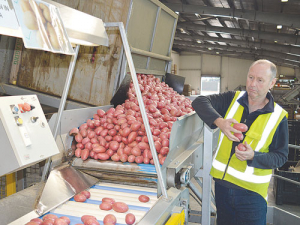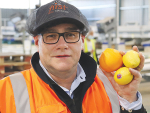Uncertainty over continued access to fertile land and irrigation water are potentially forcing some vegetable growers out of business.
The Pukekohe Vegetable Growers Association president Brent Wilcox says land and water are the main issues facing many of its member businesses; ranging from smaller single property units to large operations with diverse land holdings.
“Over time we are seeing consolidation of many small growers into fewer larger growers; there is uncertainty and many growers are faced with a decision trying to figure whether they can justify the cost of taking land and water issues on,” he told Rural News.
Auckland’s urban sprawl has reached Pukekohe, a key region for growing potatoes, onions, carrots and greens; in western Pukekohe, new homes are being built on land with potential for vegetable farming.
Many of Pukekohe’s vegetable growers are also growing in the Northern Waikato region and face new land and water usage regulations under Waikato Regional Council’s Healthy Rivers Plan to clean-up major rivers.
A new area of concern is the proposed plan by the Greens and Labour to levy a charge on water, seen by farmers as another stumbling block to farming.
Wilcox says the association, with Hort NZ, is working with both Auckland and Waikato Regional councils to finalise policies to help protect quality soils and farmer access to water.
Farmers are questioning whether enough is being done to preserve the high-value soil in Pukekohe that provides produce to New Zealanders all year round.
“The new subdivisions in western Pukekohe......farmers are questioning whether that’s the best place for sub-divisions.
“Those are in place now and we can’t wind back the clock....how do we ensure that more sub-divisions don’t continue to gobble up fertile land.
“We are working with the council in the hope policies are formed that don’t think such sub-divisions are necessary and won’t be in future plans.”
Wilcox says some have suggested the farmers could move further south as more land at Pukekohe is diverted to housing. Unfortunately, it’s not that simple.
While some growers have moved further south, Pukekohe soils are quite unique in terms of their productive capacity; frost-free land and strong soils that can carry vegetables through winter are unique to the area.
Wilcox family company, A S Wilcox & Sons has expanded beyond Pukekohe- growing carrots, onions and potatoes in Matamata and Ohakune.
However, Pukekohe remains a key region for growing vegetables.
“This area is still important strategically, for winter production of crops like potatoes and carrots for spring supply that’s not possible in many other places ...lettuce and greens are grown year-round here and is very important for winter supply.
The soils here are best suited for vegetables...it’s important we maintain access to those soils where we can.”
Pukekohe gets over 1350mm of rain every year but some growers use irrigated water to produce vegetables year-around.
Wilcox says while farmers are cognisant of using water efficiently, if irrigated water was turned off they wouldn’t survive.
Pukekohe has no community water schemes; individual growers apply for water consent and build their own irrigation infrastructure at considerable expence to provide irrigation for crops. Wilcox says to be charged on top of that again would be“an exercise quite prohibitive for growing units.”
He says charging for water would add another layer of cost for growers, which had not been factored into business decisions to invest in irrigation.
“We may be able to do at a price; these costs will have to be past on to consumers which will have significant impacts on the price of vegetables.”











